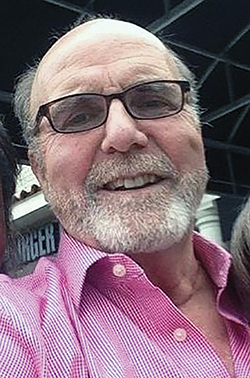Oral Cancer Survivor
Out of Tragedy Comes Resilience and Compassion
 When John Brislin, an avid biker and golfer, broke his neck in October 2017, he was surprised to learn that the tests showed he also had cancer at the base of his tongue. Adjusting to all of this news at once was difficult, but he had his neck plated and then began cancer treatments. Currently, he has no evidence of cancer and is back riding bikes, golfing and enjoying time with his wife and family. He volunteers at Friend for Life Cancer Support Network to help other head and neck cancer survivors.
When John Brislin, an avid biker and golfer, broke his neck in October 2017, he was surprised to learn that the tests showed he also had cancer at the base of his tongue. Adjusting to all of this news at once was difficult, but he had his neck plated and then began cancer treatments. Currently, he has no evidence of cancer and is back riding bikes, golfing and enjoying time with his wife and family. He volunteers at Friend for Life Cancer Support Network to help other head and neck cancer survivors.
In October 2017, I was riding my bike at a park where vehicles aren’t allowed. Pathways and bridges have barriers to prevent cars from entering, and unfortunately I hit one of them. I immediately began losing feeling from the neck down. People nearby helped me call my wife and son, but I was so worried that I jumped into my car and drove myself to the ER.
The ER doctor wanted to do a CT of my neck, but I am very claustrophobic and refused at first. After being given morphine, I finally agreed. The CT scan confirmed I broke the C2 vertebra in my neck and that I had cancer at the base of my tongue. I was shocked. I had experienced pain in my mouth off and on in the past, but I didn’t think it was anything serious and didn’t see a doctor.
I wasn’t a good candidate for cancer surgery because of my broken neck. I had to get vertebrae C2 through C5 plated before my doctor would start treatment with chemotherapy and radiation. Next, I had the procedure to put in a port for the chemotherapy. Then I was fitted for a thermoplastic mask for the radiation treatments. Considering my claustrophobia, I was concerned, but my nurses were very helpful. They recommended watching videos online to get familiar with what would happen. I was still very nervous for the first fitting. The radiation technicians were really sweet and kind to me through the fitting and all of my treatments.
The first radiation treatment was only 8 to 10 minutes long. Eventually I got used to it and could count down the time I had left, which allowed me to relax and zone out during the treatment.
My doctor warned me that the side effects could make it difficult to eat, and he suggested I get a G-tube (feeding tube). I resisted, and I bet him a bottle of wine that I could get through it without the tube. I completely lost my sense of taste, but I continued eating out of habit. Overall, I tolerated the chemotherapy fairly well with no nausea, just a weird feeling all over and a swollen neck.
The treatment worked but a routine follow-up CT showed a suspicious spot in my nasal cavity. The doctor was unable to remove it surgically, and he had a committee of doctors review my case. They couldn’t positively confirm it was cancer, but they agreed it should be treated as cancer. My doctor offered me immunotherapy.
Taking immunotherapy was so much easier than chemotherapy. It was given as an infusion that took less than an hour. The only real side effect was diarrhea, but my doctor had warned me about it and prescribed medications to counteract it. Now, the spot seen on my last scan is gone, and I continue to be monitored every three months. I have regained my strength, ride my bike again and golf a few times a week. I don’t worry about a recurrence because if I have one, I know I’ll start treatment again.
My family and friends from my hometown supported me through everything, but the most help came from the father of my son’s friend in Colorado, who also had head and neck cancer. It helped to talk to someone who had gone through something similar, and I realized I wanted to be there for others.
My nurse therapist recommended I volunteer for Friend for Life Cancer Support Network, an organization made up of cancer survivors and caregivers who provide compassionate, one-on-one support to others diagnosed with cancer and their loved ones. Now I talk with other people about head and neck cancer and offer my support as they work through their diagnoses. When talking to other survivors, I’ve learned that you need to be respectful of their time and space. Some may want to talk more than others. Go at their pace.
Another way I help others is by sharing my experience with first-year students in medical school. It helps them to ask questions and better understand the issues surrounding head and neck cancer patients.
Be sure to ask your doctor plenty of questions. Don’t let the negative thoughts build up in your mind. Share your concerns with your health care team. They are there to help you.
One thing to remember about cancer is that once you have it, you’re a member of that community forever. You’re also surrounded by some of the nicest people who want to help you.


